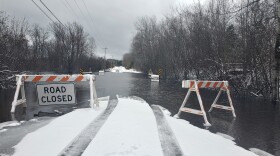Wetlands host a myriad of benefits. They can help reduce flooding, purify water, and provide habitat for dozens of wildlife species.
“It seems like for a lot of environmental issues and challenges today, wetlands are an important solution,” said Bruce Ross, the Executive Director of the Wisconsin Waterfowl Association.
Last year, the conservation organization hired two ecologists to survey public properties owned by the Wisconsin Department of Natural Resources that could be restored to wetlands.
“Much of that land has come from agricultural practices where there has been hydrology removed from the land, meaning that there's ditches or there's tiles and the wetlands that were once there have been impaired in the search for creating more agricultural land. We are working with the DNR under this program to identify those properties and restore the hydrology that was there originally,” explained Ross.
So far, more than 150 public properties have undergone desktop review. There are a couple properties in the planning process. Work is expected to begin at the Navarino Wildlife Area in Shawano County this year.
“Those same wetlands that allow the brooding and the life cycle of the waterfowl, it also provides community services to the communities that surround those wetlands, flood retention and water purification and water retention. In addition, carbon sequestration is very high in wetlands. So the more wetlands we can put on the land, the better our communities will be,” said Ross.
The group is also expanding its work to restore wild rice beds, primarily in the Ceded Territories. The WWA is working with the DNR and Great Lakes Indian Fish and Wildlife Commission to buy and harvest wild rice so that it can be reseeded.
“We had 12 volunteers last year who collected 200 pounds of rice out in rice beds for reseeding in other locations,” said Ross. “It's kind of fun. It's certainly interesting. It gives you a better appreciation for the Native culture that finds wild rice so important.”
For Ross and the WWA, this work is critical to supporting waterfowl habitat.
For 40 years now, the WWA has focused on habitat restoration, helping hunters develop their skills, and advocating for policies that support waterfowl and wetlands.
“Even though we're harvesting birds, we relish the habitat they live in, we care for the species. They are managed at a continental level. Hunters and others are bringing money to the table to help do that,” said Ross.
Ross says the group is always looking for volunteers to help with their conservation work. You can learn more about the organization and get involved on the Wisconsin Waterfowl Association website.






